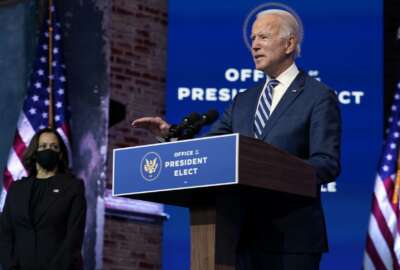
“Cancel” Trump appointee gambit is wrong and nasty
No, people who are about to leave government should not be "canceled."
The celebrity death match over the White House continues. Now a member of Congress has made statements to the effect that those who served in the Trump administration would deliberately delete or erase references to their service. The member presumes these people would want to hide the fact of their service so they could work elsewhere.
That prompted a group to state that anyone who worked for, funded or elected Trump must not “profit” from that experience. Politico reported this, with a headline stating the member wants to “cancel” such people.
As the saying goes, we’re better than our politicians.
The Politico headline further pointed out how well former George W. Bush administration appointees did, but so did former appointees of the Clinton and Obama administrations. “Profiting” from administration work is a thoroughly bipartisan phenomenon. Think tanks, law firms, consulting practices, foundations and corporations (often contractors) vacuum up former appointees for what are sometimes breathtaking salaries. For that matter, they ingest plenty of retired career federal employees. Many of them continue to help the government with policy advice, white papers, service on boards and commissions, and — yes — even contracts.
In fact an amplifying effect often comes into play. Former appointees go back in when the party in the White House changes, often at a notch higher than before. When they leave the second time, having made a down payment with the “crummy” federal salary, the final rewards are greater still.
Certainly none of this is news to you.
As someone who knows scores of such people, I can say nearly all of them have served either Democrat or Republican administrations out of perfectly honorable motives and with respect for the public and public service. Moreover, they get along with one another. A subset of people have worked in both parties’ administrations.
So canceling, aspersion, impugning of character or fitness by association is outside the pale, all the more so when prompted by a member of Congress. It’s rather nasty, as a matter of fact. The Trump administration has certainly been unusual. It’s prompted strong emotions. Its policies and those executing them have often been hyper controversial. I’ll leave the legacy for others to debate but out of a sense of basic fairness, I point out that many people have served in this administration with no less integrity and effectiveness than that of their counterparts in other administrations.
A few cases in point:
Walter Copan, National Institute of Standards and Technology director: A scientist himself, he gets high marks from career people I’ve spoken to. He has compared favorably to the talented Pat Gallagher, who served for several years during the Obama administration.
Dana Deasy, Defense Department chief information officer: The secretary of Defense slot under Trump has been operatic, but Deasy has provided steady leadership in data and systems issues that transcend whoever is at the top — despite the JEDI cloud contract nonsense.
Jim Gfrerer, Department of Veterans Affairs CIO: Gfrerer has been there less than two years, but that time has seen real progress in modernizing the systems that brought VA so much trouble. And now there’s at least a piece of tangible progress in the electronic health records initiative, which will go on well past the Biden administration.
Andrei Iancu, director of the U.S. Patent and Trademark Office: USTPO expedited patent filing evaluations for COVID-related inventions, accelerated international cooperation on intellectual property, and initiated a way to widen participation in the patent system by U.S. would-be inventors.
Suzette Kent, former federal CIO: She accomplished a needed update and brush-clearing of IT policies superseded by new technology. These included arcane-sounding but critical policies on the Trusted Internet Connections, cloud computing and data management. Now they’re on paths to regular review.
Paul Lawrence, VA under secretary for the Veterans Benefits Administration: Several new programs got done under him, such as the Navy Blue Water payments for certain Vietnam veterans. He’s seen to reductions of case backlogs and conducted a long campaign of listening sessions throughout the country to hear what’s on veterans’ minds.
Army Secretary Ryan McCarthy: Previously undersecretary and acting secretary, McCarthy drove an important reorganization of the Army led by the then-new Futures Command. More recently, he has pushed “enduring change” with respect to diversity and inclusion within the ranks — a worthy goal for an organization that was among the earliest in the United States to desegregate in the first place.
Emily Murphy, administrator of the General Services Administration: Correct, she hasn’t signed the ascertainment letter — the lack of which Joe Biden said doesn’t hold up his transition progress. Until all state certifications and recounts are done, she really can’t sign. GSA under Murphy has made tangible progress on nuts-and-bolts projects such as consolidation of the Multiple Awards Schedule contracts, rebooting a failed small business governmentwide contracting vehicle, and pushing the often Jell-O-like move to new telecommunications vehicles.
Charles Rettig, IRS commissioner: We understand he’s had fruitful conversations with John Koskinen, the last IRS commissioner under Obama. Under Rettig, the IRS managed to do its duties under the Cares Act, completed a filing season distorted by the pandemic and has found footing in its long-running modernization initiative.
David Shulkin, Trump’s initial VA secretary: He got the EHR record project off stasis, and started to widen the idea of telemedicine. Perhaps out of naivete, he got chopped in the spinning propeller of the Washington gotcha-scandal engine. But ultimately, his first concern was good medicine for veterans.
Margaret Weichert, former deputy director for management at OMB: At the Office of Management and Budget, she shepherded the Trump administration’s version of the President’s Management Agenda which looked very much like a continuance of good-government initiatives threading through 16 years of prior administrations.
These people may or may not be “Trumpists.” If they are, they don’t say it. They have simply served and tried to do good. My apologies to those I have left out.
Some of the Biden transition team advisers I’ve also known and interviewed include Carolyn Colvin, Seth Harris, Nancy Potok, Aneesh Chopra, Ann Dunkin, Craig Fugate, Peter Neffenger — they’re not “Bidenists” but Democrats who wish to help in some way, having served honorably earlier.
Let’s not gloss over the deep and barb-studded political divisions on the country. But let’s also not vilify those who were fairly motivated to work for the other guy.
Copyright © 2025 Federal News Network. All rights reserved. This website is not intended for users located within the European Economic Area.
Tom Temin is host of the Federal Drive and has been providing insight on federal technology and management issues for more than 30 years.
Follow @tteminWFED
Related Stories






